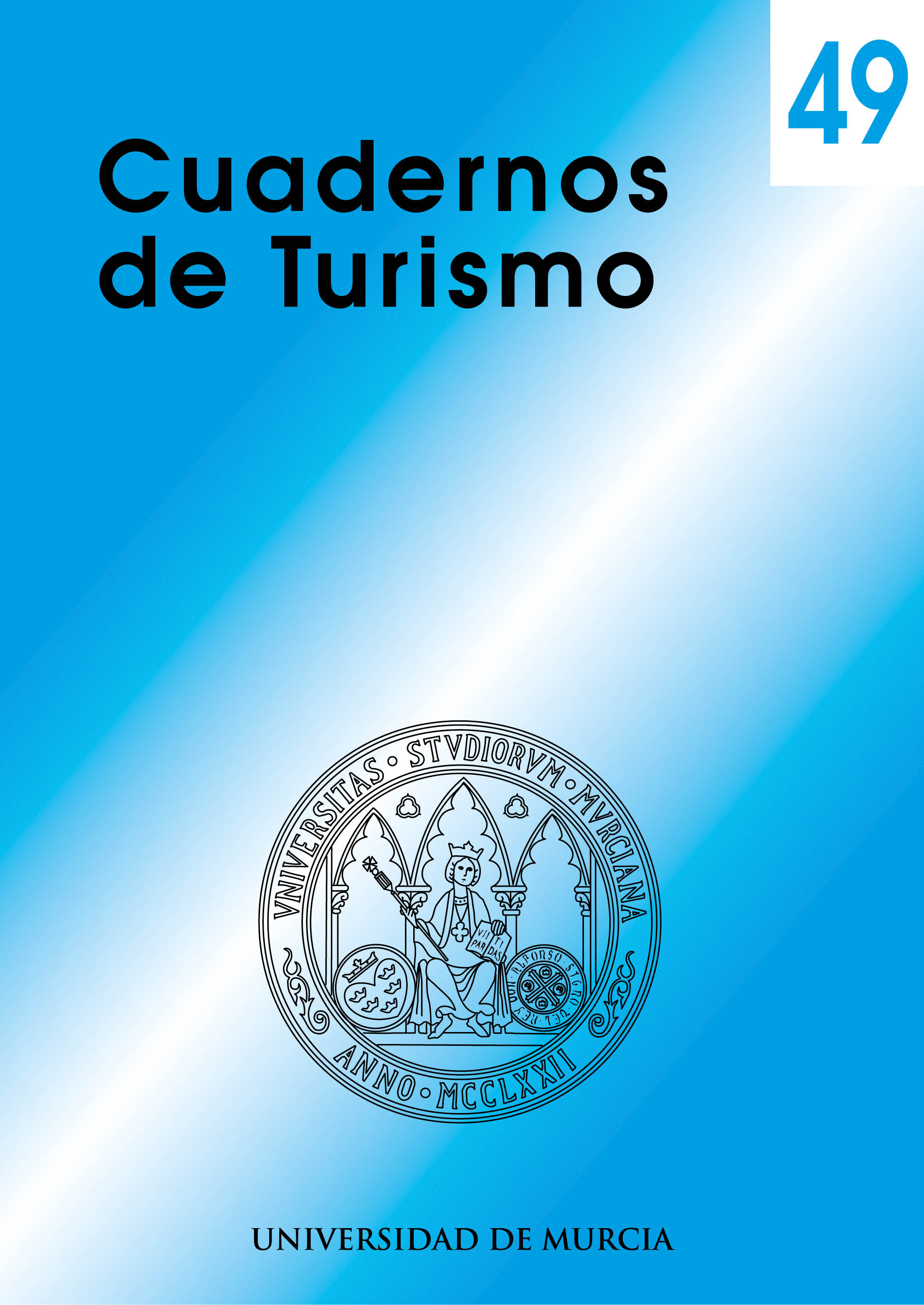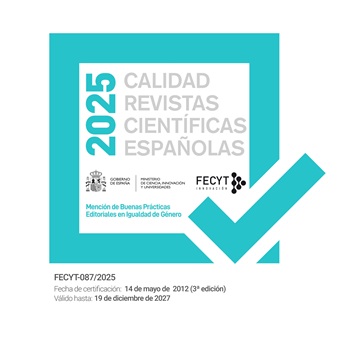TURISMO ACADÉMICO A TRAVÉS DE LA PERSPECTIVA DE ESTUDIANTES ERASMUS
Resumen
Este artículo realiza una revisión de la literatura sobre un tema aún poco explorado, que es el turismo académico, y explora empíricamente las perspectivas de los estudiantes internacionales que han elegido la ciudad de Oporto para emprender la movilidad Erasmus. El objetivo principal del estudio es comprender mejor las motivaciones y factores que influyen en las decisiones de los estudiantes internacionales para elegir la ubicación donde desarrollar sus programas de movilidad. Se administró una encuesta en línea y se recogieron un total de 122 respuestas válidas. Los datos se analizaron mediante estadísticas descriptivas y de inferencia. Los resultados muestran que hay cuatro factores principales que influyen en este segmento: la calidad y el prestigio de las universidades; características y hospitalidad de las personas; clima y paisaje; siendo un destino de moda.
Descargas
-
Resumen1189
-
PDF (INGLÉS) 1723
-
PDF (ESPAÑOL)1723
Citas
AMARO S., BARROCO C., MARTINS C. and ANTUNES J. (2018): «Erasmus students in Portugal: from students to tourists and advocates», European Journal of Tourism Research, vol. 22, pp. 94-106.
ARTEAGA ACOSTA, E. (2004): Movilidad Socrates – Erasmus en las universidades europeas de la Macaronesia. Las Palmas de Gran Canaria, Universidad de Las Palmas de Gran Canaria.
BARTON, C., HAYWOOD, J., JHUNJHUNWALA, P. and BHATIA, V. (2013): Travelling with millennials, The Boston Consulting Group, SP, available at: www.bcg.com/documents/file129974.pdf
BEALL, G. (2017): 8 Key Differences between Gen Z and Millennials, available at: https://www.huffingtonpost.com/george-beall/8-key-differences-between_b_12814200.html?guccounter=1
BENTO, J.P.C. (2014): «The determinants of international academic tourism demand in Europe», Tourism Economics, vol. 20 (3), pp. 611-628. https://doi.org/10.5367/te.2013.0293
BOKAREVA M. (2014): «Social causes of Russian students’ motivation to study abroad», Procedia - Social and Behavioral Sciences, vol. 127, pp. 124-128.
BRACHT, O., ENGEL, C., JANSON, K., OVER, A., SCHOMBURG, A. and TEICHLER, U. (2006): The Professional Value of Erasmus Mobility. International Centre for Higher Education Research, University of Kassel, Kassel, Germany.
CAVAGNARO, E., STAFFIERI, S. and POSTMA, A. (2018): «Understanding millennials’ tourism experience: values and meaning to travel as a key for identifying target clusters for youth (sustainable) tourism», Journal of Tourism Futures, vol. 4 (1), pp. 31-4. https://doi.org/10.1108/JTF-12-2017-0058.
CHEN, P.J. and KERSTETTER, D.L. (1999): «International students’ image of rural Pennsylvania as a travel destination», Journal of Travel Research, vol. 37 (3), pp. 256-266.
CHHETRI, P., HOSSAIN, M.I. and BROOM, A. (2014): «Examining the generational differences in consumption patterns in South East Queensland», City, Culture and Society, vol. 5 (4), pp. 1-9.
CORBISIERO, F. and RUSPINI, E. (2018): «Millennials and Generation Z: Challenges and Future Perspectives for International Tourism», Journal of Tourism Futures, vol. 4 (1), pp. 3-6. https://doi.org/10.1108/JTF-03-2018-069
EENEE (2007): European Expert Network on Economics of Education. Available at: http://www.eenee.de/eeneeHome/EENEE/Analytical-Reports.html
EISNER, S.P. (2005): «Managing Generation Y», SAM Advanced Management Journal, vol. 70 (4), pp. 4-15.
ESN (2007): ESN Survey 2007: Generation Mobility. Available at: http://www.esn.org/survey2007/
EUROPEAN CENTRE FOR DISEASE PREVENTION AND CONTROL (ECDC) (2020): Latest situation update worldwide, retrieved 30 January 2021, from https://www.ecdc.europa.eu/en/geographical-distribution-2019-ncov-cases.
EUROPEAN COMISSION (2021): Erasmus+ Annual Report 2019 Statistical Annex, file:///C:/Users/User/Downloads/NCAR20101ENN.en%20 (1). pdf. accessed 5/02/2021
EUROPEAN PARLIAMENT (2010): Improving the participation in the Erasmus Programme. Brussels. Available at: http://www.europarl.europa.eu/studies
EUROPEAN TRAVEL COMMISSION (ETC) (2020): Study on Generation Z Travellers: A handbook produced for the European Travel Commission (ETC), Brussels, ETC Market Intelligence.
FIGEL, J. (2007): 20 Years of Erasmus. Available at: http://ec.europa.eu/commission_barroso/figel/speeches/docs/07_10_04_Erasmus_Lisbon_en.pdf.
GARCÍA-RODRIGUEZ F. and JIMENEZ J. (2015): «The role of tourist destination in international students’ choice of academic center: the case of Erasmus programme in the Canary Islands», PASOS. Revista de Turismo y Patrimonio Cultural, vol. 13 (1), pp. 175-189.
GONZÁLEZ, C.R., MESANZA, R.B. and MARIEL P. (2011): «The determinants of international student mobility flows: an empirical study of the Erasmus programme», Higher Education: The International Journal of Higher Education and Educational Planning, vol. 62 (4), pp. 413-430.
GRETZEL, U., FESENMAIER, D.R., FORMICA, S. and O’LEARY, J.T. (2006): «Searching for the future: Challenges faced by destination marketing organizations», Journal of Travel Research, vol. 45 (2), pp. 116-126. http://dx.doi.org/10.1177/0047287506291598
HAMED, H. (2017): «Marketing Destinations to Millennials: Examining the Compatibility between the Destination Marketing Organization Website and the Millennial Tourist Prospects», Journal of Tourism and Recreation, vol. 3 (1), pp. 1-20.
HUGHES, K., WANG, J. and ANDSHU, M. (2015): «Exploring the travel patterns, preferences and recommendations of Chinese university students living in Australia», Journal of Hospitality and Tourism Management, vol. 23, pp. 12-22.
KRZAKLEWSKA, E. and KRUPNIK, S. (2005): The experience of studying abroad for exchange students in Europe. Brussels, Petrus Communication.
KUNEVA, M. (2007): Speech of Commissioner Meglena Kuneva on 20 Years of Erasmus. Available at: http://ec.europa.eu/commission_barroso/kuneva/speeches/20y_erasmus_090507_en.pdf.
LEASK, A., FYALL, A. and BARRON, P. (2013): «Generation Y: opportunity or challenge – strategies to engage Generation Y in the UK attractions’ sector», Current Issues in Tourism, vol. 16 (1), pp. 17-46.
LESJAK M., JUVAN E., INESON E., YAP M. and AXELSSON P. (2015): «Erasmus student motivation: Why and where to go?», Higher Education, vol. 70, pp. 845-865.
LI, X., LI, X. and HUDSON, S. (2013): «The application of generational theory to tourism consumer behavior: An American perspective», Tourism Management, vol. 37, pp. 147-164. https://doi.org/10.1016/j.tourman.2013.01.015
LLEWELLYN-SMITH C. and MCCABE S. (2008): «What is the attraction for exchange students: The host destination or host university? Empirical evidence from a study of an Australian university», International Journal of Tourism Research, vol. 10 (6), pp. 593-607.
LÓPEZ X.P., FERNÁNDEZ M.F. and INCERA A.C. (2016): «The Economic Impact of International Students in a Regional Economy from a Tourism Perspective», Tourism Economics, vol. 22 (1), pp. 125-140. https://doi.org/10.5367/te.2014.0414
MICHAEL, I., ARMOSTRONG, A. and KING, B. (2003): «The travel behaviour of international students: The relationship between studying abroad and their choice of tourist destinations», Journal of Vacation Marketing, vol. 10 (1), pp. 57-66.
MONTEIRO A. and PEREIRA A. (2016): «Erasmus Student Travel Motivations: A Factor-cluster segmentation Approach», Revista Turismo Estudos e Práticas, vol. 5 (1), pp. 7-39.
OBORUNE, K. (2013): «Becoming more European after Erasmus? The impact of the Erasmus programme on political and cultural identity», Epiphany: Journal of Transdisciplinary Studies, vol. 6 (1), pp. 182-202.
OECD. (2017): Education at a Glance 2017: OECD Indicators, Paris: OECD Publishing. URL: http://dx.doi.org/10.1787/eag-2017-en
PADRÃO, M.H., GUERRA, I., MARNOTO, S., PADRAO, R. and OLIVEIRA, C. (2012): «Erasmus Students In Portugal: The Perception and the impact of International Crisis», Regional and Sectoral Economic Studies, vol. 12 (2), pp. 133-148.
PALFREY, J. and GASSER, U. (2008): Born Digital. Understanding the First generation of Digital Natives, Basic Books, New York, NY, available at: http://pages.uoregon.edu/koopman/courses_readings/phil123-net/identity/palfrey-gasser_born-digital.pdf
PAREY, M. and WALDINGER, F. (2010): «Studying abroad and the effect on international labour market mobility: evidence from the introduction of Erasmus», The Economic Journal, vol. 121, pp. 194-222.
PAWLOWSKA E. and ROGET M. (2009): «Una aproximacion al impactoeconomicodirecto del turismo académico: El caso de los intercambios Erasmus en la universidad de Santiago de Compostela», Revista Galega de Economia, vol. 18 (2), pp. 1-20.
RICHARDS, G. (2007): New Horizons II: The Young Independent Traveller 2007, WYSE Travel Confederation, Amsterdam, available at: www.studywyse.org/new-horizons/
RITCHIE, B.W., CARR, N. and COOPER, C.P. (2003): Managing educational tourism. Great Britain: Channel View Books.
ROBINSON, V. and ANDSCHÄNZEL, H. (2019): «A tourism in flex: Generation Z travel experiences», Journal of Tourism Futures, vol. 5 (2), pp. 127-141. https://doi.org/10.1108/JTF-01-2019-0014
RODRIGUEZ, X.A., MARTINEZ‑ROGET, F. and PAWLOWSKA, E. (2012): «Academic tourism demand in Galicia, Spain», Tourism Management, vol. 33 (6), pp. 1.583‑1.590. https://doi:10.1016/j.tourman.2012.01.010.
RUSPINI, E. and ANDBERNARDI, M. (2018): «Sharing economy e turismo. Il contributo delle nuove generazioni –Sharing economy and tourism. The role of the new generations», in Nuvolati, G. (Ed.), Sviluppourbano e politiche per la qualitàdella vita. FUP Editore, Firenze, pp. 127-147.
SEEMILLER, C. and ANDGRACE, M. (2016): Generation Z Goes to College. Jossey-Bass, San Francisco.
SLIVAR, I., ALERIC, D. and DOLENEC, S. (2019): «Leisure travel behavior of generation Y & Z at the destination and post-purchase», E-Journal of Tourism, vol. 6 (2), pp. 147-159.
SOUSA, B. and SIMÕES, C. (2010): «Comportamento e perfil do consumidor de turismo de nichos», Tékhne – Revista de Estudos Politécnicos, nº 14, pp. 137-146.
TEICHLER, U. (2007): "International Dimensions of Higher Education and Graduate Employment", in J. Allen and R. Van der Velden (Eds.) The Flexible professional in the Knowledge Society: General Results of the REFLEX project, Springer, Dordrecht, pp. 177-197.
TUTEK, E., GEBBIE, M., CHAN, K. and DURAND, D. (2015): Tourism Megatrends 10 things you need to know about the future of Tourism. Retrieved fromhttp://corporate.cms-horwathhtl.com/wp-content/uploads/sites/2/2015/12/Tourism-Mega-Trends4.pdf
UNWTO (2010): International recommendations for tourism statistics 2008. New York, United Nations.
WEAVER D. (2003): «The contribution of international students to tourism beyond the core educational experience: Evidence from Australia», Tourism Review International, vol. 7, pp. 95-105.
Las obras que se publican en esta revista están sujetas a los siguientes términos:
1. El Servicio de Publicaciones de la Universidad de Murcia (la editorial) conserva los derechos patrimoniales (copyright) de las obras publicadas, y favorece y permite la reutilización de las mismas bajo la licencia de uso indicada en el punto 2.
2. Las obras se publican en la edición electrónica de la revista bajo una licencia Creative Commons Reconocimiento-NoComercial-SinObraDerivada 3.0 España (texto legal). Se pueden copiar, usar, difundir, transmitir y exponer públicamente, siempre que: i) se cite la autoría y la fuente original de su publicación (revista, editorial y URL de la obra); ii) no se usen para fines comerciales; iii) se mencione la existencia y especificaciones de esta licencia de uso.
3. Condiciones de auto-archivo. Se permite y se anima a los autores a difundir electrónicamente las versiones pre-print (versión antes de ser evaluada) y/o post-print (versión evaluada y aceptada para su publicación) de sus obras antes de su publicación, ya que favorece su circulación y difusión más temprana y con ello un posible aumento en su citación y alcance entre la comunidad académica. Color RoMEO: verde.





_.jpg)









